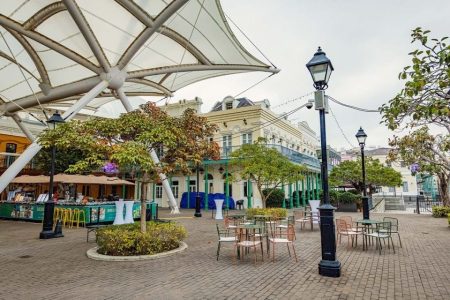In an economy better known for gambling and tourism revenues, more than US$28 billion worth of debt instruments were raised in 2024. That’s according to data from Chongwa (Macao) Financial Asset Exchange Company, which established the local bond trading platform known as MOX.
Though the amount represents an increase of a third from the previous year, the total figure denotes a fraction issued in neighbouring Hong Kong. But for money managers and legal experts, the budding transactions signal steady progress in Macao’s bid to diversify its economy and tighten its financial linkages within the Greater Bay Area (GBA). With most of that debt issued in Chinese currency, Macao is simultaneously developing its capabilities to raise offshore renminbi (RMB), broadening efforts to internationalise the currency at a time when the city’s gross gaming revenues (GGRs) account for about 80 percent of its pre-pandemic levels.
That debt-raising role has traditionally been undertaken in Hong Kong, where offshore “dim sum” bonds thrived in 2024, reaching 400 billion yuan in the first half of the year, compared to 550 billion yuan issued in all of 2023, Steven Alain Lawrence told Macao News.
[See more: Beijing to issue 5 billion yuan’s worth of treasury bonds in Macao]
For the chief investment officer of Balfour Capital Group and veteran hedge fund manager, the question is whether that momentum will carry into 2025 and how Macao will position its burgeoning financial ambitions alongside more established trading centres like Hong Kong. Despite the gap, Lawrence points to active participation from Chinese banks such as ICBC and BOC, as well as global underwriters like UBS, HSBC, and CICC, in drawing deals in Macao, which have included the participation of sovereign wealth funds and ESG-focused investors.
As the RMB offshore market grows, Macao’s strategic location and financial infrastructure should support issuers and borrowers choosing the Chinese currency to mitigate foreign exchange related risks, which also reinforces Hong Kong’s traditional position as a capital market leader, Lawrence explains.
Leveraging Macao’s strengths in bonds
While both SARs bridge onshore and offshore RMB markets, Lawrence cautions that Macao’s progress in the sector relies on collaborative policies and global stability. Examples of local partnerships were solidified back in late January. Cross-promotional ties between the two SAR bond markets were strengthened after the Hong Kong Monetary Authority (HKMA) Central Moneymarkets Unit opened direct financing channels with the Monetary Authority of Macao’s (AMCM) Central Securities Depository and Clearing Limited, effectively enabling participants to trade between the SARs with greater ease and efficiency.

Leveraging the regional strengths demonstrates the synergistic development of the GBA and highlights Hong Kong as a “super-connector,” commented HKMA chief executive Eddie Yau in a press release. In the same announcement, AMCM chairman Benjamin Chan sees the direct link offering international investors, including those from Portuguese-speaking countries, an effective way to engage in both SAR bond markets, enhancing Macao’s position as a financial services platform between China and the lusophone nations.
[See more: Guangdong to issue another round of ‘dim sum’ bonds in Macao]
The HKMA and AMCM announcement builds on recent deals integrating the SARs. At the end of December, Zhuhai Huafa Group’s three-year digital bond was dual listed in both Macao and Hong Kong, representing the first dual listed bond accessible under the southbound Bond Connect scheme.
Legal experts expect more transactions to reach the market, given notable cost and tax benefits, including an exemption from a stamp duty tax for bond issuances and transactions, comments Eduardo Loureiro, international lawyer and arbitrator with the Macao-based firm BN Lawyers.
When the Securities Law Bill was drafted under the guidance of AMCM, industry inputs were included. As the bill moves to be tabled for discussion, we may see an even more sound and attractive bond market in Macao, Loureiro believes.
[See more: Donald Trump’s inauguration sparks major uncertainty for Sino-US relations]
Though the developments are positive, market sceptics are quick to point to global uncertainties that may derail the momentum. Geopolitics and tariffs could reverse the Federal Reserve’s interest rate cut prospects, narrowing the yield differential and dampening demand for offshore RMB bonds. However, Balfour Capital Group’s Lawrence remarks that green financing may sustain interest, especially for sovereign wealth funds that see the diversification value in obtaining offshore debt.
“Both SARs remain pivotal in globalising RMB use and sustaining investor confidence in 2025,” Lawrence adds, noting that despite challenges abroad, companies with strong fundamentals will help maintain global interest in the offshore RMB market. He emphasises that this should bode well not only for Macao’s diversification campaign but also for the global use of the Chinese currency.






